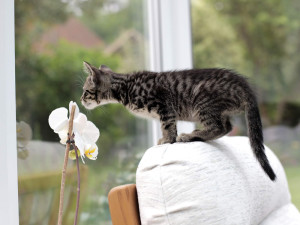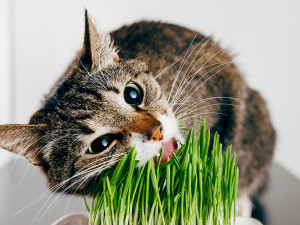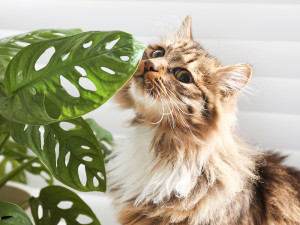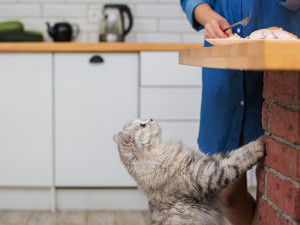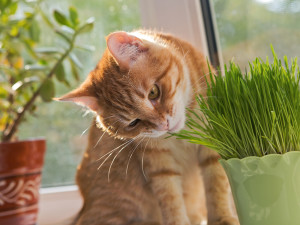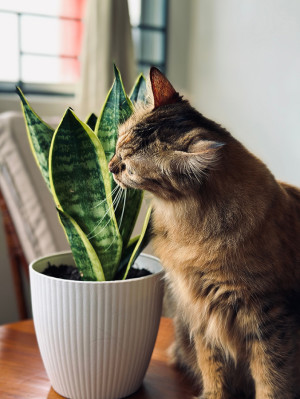Are Lilies Toxic to Cats?
This holiday weekend, keep those Easter lilies far away from your kitty.
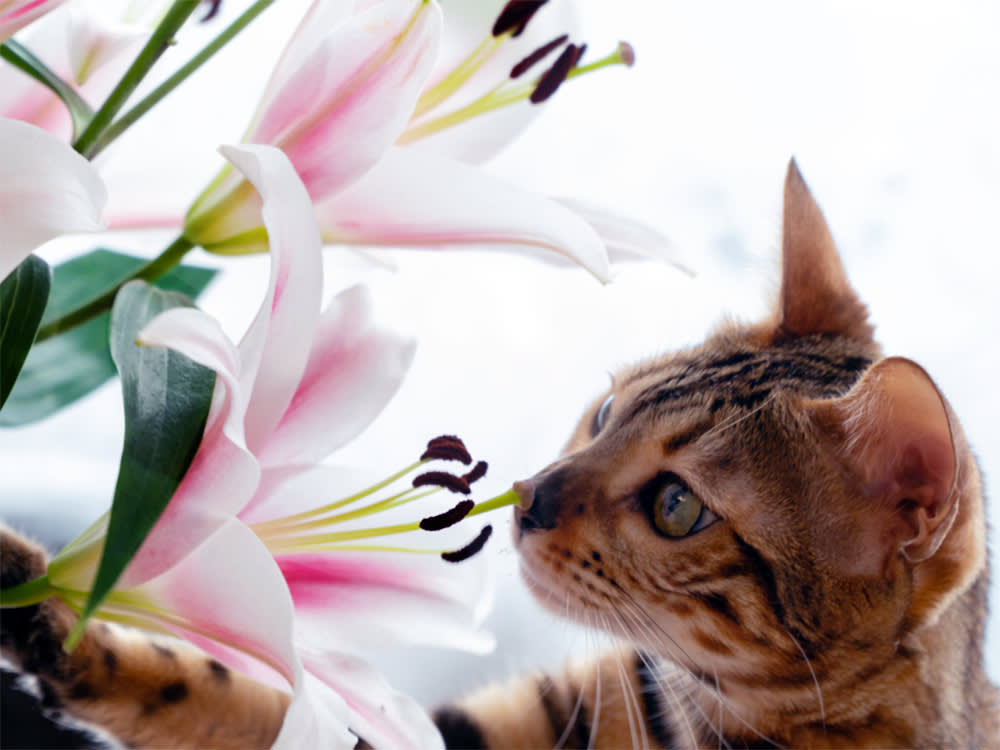
share article

Your pet wants you to read our newsletter. (Then give them a treat.)
This Easter, you might be planning on picking up some Easter lilies to decorate for those egg hunts and family dinners. But before you go placing them in easy-to-reach spots around the house, keep in mind that lilies are super toxic to cats. They’re a gorgeous springtime classic, but the popular plants can cause life-threatening illness when kitties even ingest the smallest amount.
(A quick note: There are other plants that we often call lilies that are not true lilies. While these plants do not cause the same complications, they are also not good for cats to chew on and can cause serious health problems.)
Cats are unique in their sensitivity to certain plants, so it’s especially important to familiarize yourself with which plants are safe to keep around cats and which are toxicopens in a new tab. If in doubt, keep any potentially toxic plants out of reach of your cats, or better yet, out of your home entirely. Learn more about the dangers of lilies to cats below.
Why are lilies dangerous to cats?
True lilies are very dangerous to cats because they can cause sudden kidney failure that can be fatal. True lilies belong to the genus Lilium and include plants known as the tiger lily, Casa Blanca lily, stargazer lily, Oriental lily hybrids, Japanese lily, Easter lily, bubrum lily, red lily, and the wood lily. Additionally, plants of the genus Hemorocallis can also cause kidney failure in cats, and this includes the day lily.
These plants are usually grown from bulbs, have an appealing odor, and may be found in flower bouquets as well as in indoor and outdoor planters. The plants are highly toxic to cats, which means they only need to chew on a small amount of the plant — including the leaves and/or flowers — in order to get sick.
In some cases, cats have even been reported to get sick from inhaling the pollen of a lily or drinking water from a vase containing lilies, so it is extremely toxic even in minuscule amounts. A compound in the plant thought to be a type of glycoalkaloid is most likely responsible for its toxicity, though it is still under investigation. The result is severe damage and death to certain cells in the body, mainly in the kidneys, but sometimes in the pancreas, liver, and brain as well.
What should I do if my cat has eaten a lily?
If you see your kitty eating a lily, take it away immediately and head straight to the vet. These toxicity cases have the best outcomes when cats receive aggressive treatment as soon as possible. This is not a situation to wait and see how your cat reacts. Your best option may be to head to an emergency clinicopens in a new tab that is best equipped to provide intensive care and monitoring. You should also contact a pet-poison hotline on the way. If you know the exact kind of lily your cat ingested, be sure to keep that information handy to share with the hotline and your vet.
If you aren’t sure, try to bring a piece of the plant or a photo with you so that you can get help identifying the plant. In cases where you do not directly observe your cat eating the lily but find the plant was chewed on, knocked over, or that they are already showing signs of illness, these are all reasons to head to the vet right away.
Many of the signs of lily toxicity can overlap with other causes of illness in cats, so any time they are acting sick, it’s important to get them to the vet. If you have lilies in your home, that is always worth mentioning to your vet.
Diagnosing lily toxicity in cats
Lily toxicity causes a fairly specific set of signs in cats, so it may be considered for any cat who develops sudden kidney failure. If you know you have lilies in your home or observed your cat chewing on plants, that is very important information to mention to your vet as well.
The diagnosis of kidney failure is based on blood tests that will show elevations in certain kidney-specific values and is often confirmed using ultrasound to visualize the kidneys and a urinalysis to analyze the composition of the urine. These tests can diagnose kidney failure, but they cannot test specifically for toxins in lilies to confirm if that was the cause. Other toxins, infections, and congenital conditions can also cause kidney failure, so it’s very useful to know if a cat was exposed to a specific toxin, such as a plant.
Symptoms of lily toxicity in cats
Lily toxicity causes kidney failure and may also cause damage to the pancreas and brain. Cats with these conditions may show signsopens in a new tab including:
Vomiting
Drooling
Tremors
Painful belly
Seizures
Lethargy
Increased urination, or lack of urinating in severe cases
Treatment
There is no antidote for lily toxicity, but your cat will need aggressive supportive care immediately to give them the best chance for survival. Initial treatment may involve decontamination of the digestive tract, either by inducing vomiting or giving them charcoal by mouth.
Treatment for kidney failure includes intravenous fluids and medications to ease symptoms, including anti-nausea medications and pain medications. For cats who also show neurological signs, such as tremors or seizuresopens in a new tab, anticonvulsant medications may also be needed.
These cats need to be hospitalized — usually for multiple days — to provide intensive care, ongoing monitoring, and to support their recovery. In these cases, early treatment makes a huge difference in their prognosis, as cats who are treated early before they have signs of toxicity have the best chance for a full recovery.
How to prevent plant poisoning
Prevention is the best medicineopens in a new tab when it comes to lilies. The safest option is to keep the most toxic plants, like true lilies, out of your home entirely. If your cat has no access to them, accidents can’t happen. If there are lilies in the home that you can’t get rid of completely, be sure to cat-proofopens in a new tab your space as much as you possibly can and keep lilies and any other toxic plants out of reach.
This means that ideally, these plants should be in a sealed-off room that your cat cannot access. Unfortunately, lilies seem to have an irresistible smell to cats, and they have been known to go to great lengths to seek them out in a home. We all know cats can be incredible acrobats, too, so don’t assume that your lily is out of reach just because it’s on a high shelf or narrow window sill.
If there is no way to fully cat-proof your house, you can also try to cat-proof a single room and keep your cat in that room when unsupervised. Be sure to make that room as enriching as possible for them so they don’t get bored; use scratching posts, toysopens in a new tab, catnipopens in a new tab, vertical climbing surfacesopens in a new tab, and food puzzlesopens in a new tab to keep them entertained.
Are all parts of lilies toxic to cats?
Yes, lilies are highly toxic — from their stems to their leaves to their flowers — and even their pollen. And yes, there have been cases of cats getting very sick just from sniffing or licking the pollen from a lily or even drinking water from a vase that had lilies in it. There is really no safe part of a lily plant. Period.
How do I stop my cat from eating lilies?
The best way to prevent a cat from eating lilies is to keep them out of your home. Because these are so toxic, it’s a big risk to have them around. All it takes is a lick or a bite, and your cat can get very sick. If you are not able to remove them all from your home, be sure to provide a safe space for them to hang out where they will not be able to get near the lilies.
The bottom line: Are lilies poisonous for my cat?
Unfortunately, despite being beautiful and aromatic, lilies can be deadly for cats. This is one case in which it just doesn’t pay to take the risk. There are plenty of other plants that can coexist opens in a new tabwith your cat safely, but lilies are a definite no. Every cat parent should be aware of this risk because it can cause such serious harm, and it’s important to be mindful of any plants that come into your home, whether they are part of a bouquet or a houseplant that you just couldn’t resist buying.
If in doubt, keep all flowers and plants away from your cat until you have been able to confirm their identity and find out if they are toxic to cats. There are some great apps that can help you identify plants so even those mystery plants at the grocery store can be properly researched now. And of course, if they ever get into a plant, always play it safe and contact your vet and a pet-poison hotline to discuss the best course of treatment since early intervention can save lives.
Other plants that are safe for cats:
Spider plants opens in a new tabare safe to keep around cats as long as they don’t eat large amounts of them.
Orchids are also a good choice opens in a new tabin a cat-friendly home.
Cat grass and these other plantsopens in a new tab can also safely coexist with your cat.
Other plants that are dangerous for cats:
Pine needles opens in a new tabare all toxic for cats.
Snake plants opens in a new tabare also a no-no for cats.
Poinsettiasopens in a new tab can also cause digestive upset opens in a new tabfor cats.
FAQs (People also ask):
What happens if cats eat lilies?
True lilies are highly toxic and can cause fatal kidney failure. Any cat with a lily exposure needs immediate veterinary attention.
How much lily is toxic to cats?
Lilies are toxic even in very small quantities. Any exposure should be considered toxic.
Are lilies poisonous to cats?
Yes, true lilies are highly toxic to cats. Other plants that we call lilies can be toxic as well.
Can cats eat lilies?
No, lilies are highly toxic to cats. They should not even lick or smell them.
Are lilies poisonous to cats if they smell them?
It is possible for cats to get sick just from smelling the pollen on a lily plant so they should never come into contact with lilies at all.
References:
ASPCA Poison Control: Which Lilies are Toxic to Pets?opens in a new tab
ASPCA Pro: How to Spot Which Lilies are Dangerous to Cats and Plan Treatment opens in a new tab
Journal of the American Animal Hospital Association:opens in a new tab
Journal of Veterinary Diagnostic Investigationopens in a new tab
Journal of Veterinary Diagnostic Investigationopens in a new tab

Dr. Amy Fox, DVM
Amy Fox, DVM is a small animal veterinarian in New York City. A lifelong animal lover, Dr. Fox studied biology in college and then worked as a veterinary nurse before pursuing veterinary school at Cornell University. She has worked in many different settings including shelter medicine, emergency medicine, general practice, and animal cruelty and forensics. She is especially interested in nutrition, preventative medicine and care for senior pets. Dr. Fox also enjoys writing about veterinary medicine and teaching. In her free time she loves to cook, garden, and go for long runs.
Related articles
![Cat chewing on cat grass]() opens in a new tab
opens in a new tabThe 10 Best Non-Toxic House Plants for Cats
Cats love the crunch of a houseplant. These will do them no harm.
![cat sniffing a plant]() opens in a new tab
opens in a new tab10 Plants Toxic to Cats
These plants might be beautiful, but they’re deadly to feline foragers.
![Cat asking for human food from counter]() opens in a new tab
opens in a new tab10 Human Foods That Are Safe for Cats
Good news for your begging cat: Some of your favorite snacks are safe to share.
![Cat sitting on a window sill eating cat grass]() opens in a new tab
opens in a new tabSweet Greens: The Best Cat Grass Grow Kits
Not to be confused with catnip (or other buds).
![A brown cat with a snake plant.]() opens in a new tab
opens in a new tabAre Snake Plants Toxic to My Cat?
If you have a beloved snake plant, this answer will be a bummer.
